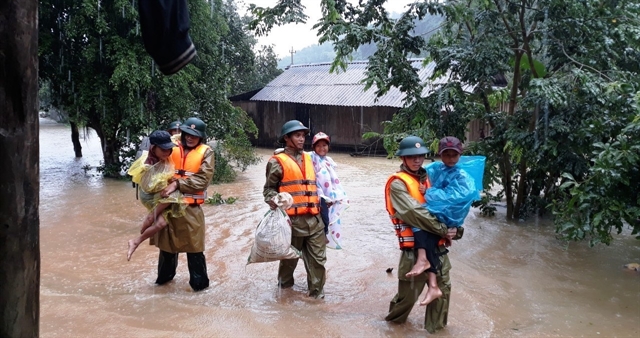 Society
Society


|
| Quảng Bình Province's border guards bring children out of inundated areas during a flood in October 2020. — VNA/VNS Photo Võ Dung |
HÀ NỘI — The Embassy of Japan and UNICEF Việt Nam signed an exchange of notes on Wednesday for a project on 'enhancing resilience to disaster risks and climate change for children', which will run in Việt Nam until 2026.
The exchange of notes was signed by Japanese Ambassador Takio Yamada and UNICEF Representative in Việt Nam Rana Flowers, in the presence of Vietnamese Deputy Minister of Agriculture and Rural Development Nguyễn Hoàng Hiệp.
The US$5.7 million project aims to build institutional capacity to support child-centred and climate-sensitive activities, through policy advocacy to support 27,000 children under 18 in central Việt Nam and the Mekong Delta, especially Sóc Trăng, Cà Màu, and Bạc Liêu provinces.
It will also improve water and sanitation services and conduct screening for severe acute malnutrition.
Speaking at the event, Hiệp thanked the Japanese Government and UNICEF for supporting risk reduction and other fields, including nutrition, healthcare, education and clean water supply, to help people in natural disaster-prone areas.
The signing of the document is an important milestone in the close partnership between the Governments of Việt Nam and Japan and UNICEF, he said.
Hiệp further noted that his ministry hopes the Government of Japan and UNICEF will continue sharing experiences and promoting Public-Private Partnership (PPP), to enhance resilience to natural disasters and management systems.
He also expects Japan and UNICEF to put forward recommendations for Việt Nam, to carry out behaviour-change campaigns, and enhance awareness of people, leaders and managers in disaster risk reduction to build a disaster-resilient society.
Flowers said that the climate crisis is a crisis of children’s rights. Việt Nam is facing climate change-related disasters, like drought and saltwater intrusion in the Mekong Delta, as well as historic floods and landslides in central Vietnam last year, the UNICEF official said.
Many communities already hit by natural disasters are suffering adverse impacts from the COVID-19 pandemic, she noted, adding that the project will address vulnerable issues in multiple areas, namely clean water, sanitation, nutrition, education and children’s protection.
Additionally, the project not only considers children as a vulnerable group, but also an agent of change for a green, clean and safe community.
According to the UNICEF Children’s Climate Risk Index 2021, Vietnamese children and adolescents are at the highest risk of being affected by climate change. — VNS




